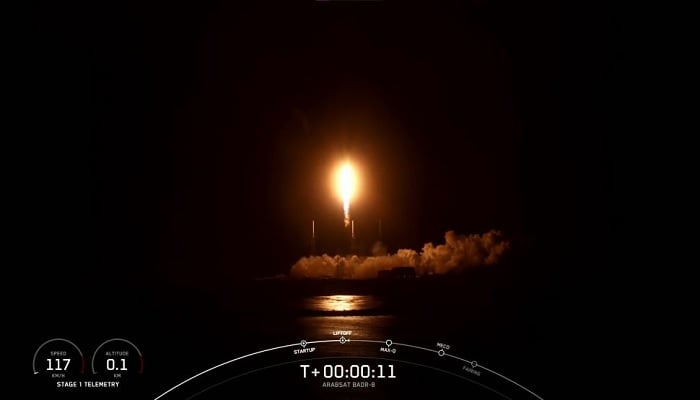SpaceX sends giant Arabsat BADR-8 satellite into orbit in 195th successful flight
Due to inclement weather, SpaceX had to postpone this mission twice earlier in the week
May 27, 2023
Elon Musk-owned SpaceX, a US spacecraft manufacturer, launcher, and satellite communications company, Saturday put a giant telecommunications satellite into Earth’s orbit, bringing the rocket-maker closer to completing its 200 successful flights back to its base, Space.com reported.
A Falcon 9 rocket carrying the Arabsat BADR-8 satellite blasted off from Cape Canaveral Space Force Station in Florida on Saturday morning (May 27) at 12:30 a.m. ET (0430 GMT).
The rocket's first stage landed on SpaceX's droneship, Just Read the Instructions, eight minutes and 46 seconds later, according to the report.
During the livestream of the launch, SpaceX's Veronica Foreman said it was the 195th successful mission for SpaceX.

Due to inclement weather, SpaceX had to postpone this mission twice earlier in the week. However, the weather conditions improved significantly tonight, allowing for a successful launch during the night amidst the humid skies of Florida's Space Coast.
As stated in a SpaceX mission description, this launch marked the 14th mission for the specific Falcon 9 first stage involved. Notably, among its previous flights were two private astronaut missions: Inspiration4 in September 2021 and Ax-1 in April 2022.
Operated by Houston-based company Axiom Space, Ax-1 successfully transported four individuals to the International Space Station, where they stayed for approximately two weeks. Recently, SpaceX launched Axiom's second mission, Ax-2, propelling its four crew members toward the orbiting laboratory atop a Falcon 9 on Sunday, May 22.
It's worth noting that the 14 flights achieved by the Falcon 9 first stage involved in this mission do not establish a SpaceX reuse record. The current record stands at 15, accomplished in December of last year during a mission that deployed a significant batch of the company's Starlink internet satellites.

Arabsat BADR-8 weighs around 9,900 pounds (4,500 kilograms), according to EverydayAstronaut.com. The satellite will be in a geostationary orbit, about 22,200 miles (35,700 kilometres) from Earth.
Moreover, it will take four to five months for the satellite to reach its operational orbit. Once it's up there and fully cleared, BADR-8 will beam TV broadcasting and other telecom services to central Africa, Europe, and the Middle East for Saudi Arabia-based Arabsat, according to EverydayAstronaut.com.











